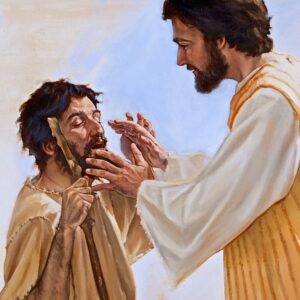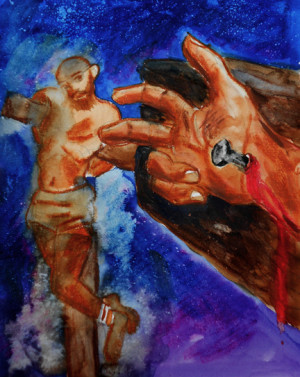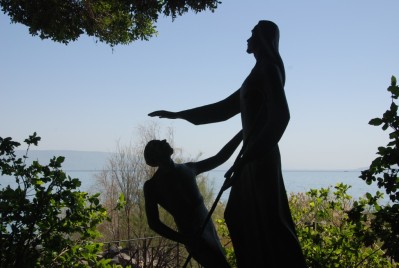 Jesus is the Face of God: He is God made visible. He is the incarnation of mercy. Moreover, mercy is the principle theme of his preaching and is manifested in how he treated people. We could say his middle name was Mercy. Jesus met people’s physical needs. In a synagogue he read his job description: “He has sent me to bring good news to the poor, to proclaim release to captives and recovery of sight to the blind, to let the oppressed go free” (Luke 4:18). When John’s disciples asked who he was, Jesus replied, “Go and tell John what you hear and see: the blind regain their sight, the lame walk, lepers are cleansed, the deaf hear, the dead are raised, and the poor have the good news proclaimed to them” (Matt 11:4-5).
Jesus is the Face of God: He is God made visible. He is the incarnation of mercy. Moreover, mercy is the principle theme of his preaching and is manifested in how he treated people. We could say his middle name was Mercy. Jesus met people’s physical needs. In a synagogue he read his job description: “He has sent me to bring good news to the poor, to proclaim release to captives and recovery of sight to the blind, to let the oppressed go free” (Luke 4:18). When John’s disciples asked who he was, Jesus replied, “Go and tell John what you hear and see: the blind regain their sight, the lame walk, lepers are cleansed, the deaf hear, the dead are raised, and the poor have the good news proclaimed to them” (Matt 11:4-5).
The gospels tell of times Jesus showed compassion:
- He saw a great crowd; and he had compassion for them and cured their sick. (Mt. 14:14)
- Two blind men: “Moved with compassion, Jesus touched their eyes.” (Mt. 20:34)
- “I have compassion for the crowd, because they have been with me now for three days and have nothing to eat.” (Mk 8:2)
- “A leper came to him. Moved with pity Jesus stretched out his hand and touched him.” (Mk. 1:40)
- Widow of Nain whose son died: When the Lord saw her, he had compassion for her and said to her, “Do not weep.” (Lk. 7:13)
Yes, Jesus, the divine physician, healed bodies, apparently thousands of them. The second aspect of his mercy was that he healed diseases of the soul. He remarked, “Those who are well have no need of a physician, but those who are sick; I have come to call not the righeous but sinners” (Mark 2:17). Jesus associated with sinners, called them to repentance, and forgave them. Here are a few instances:
The Paralytic. As Jesus is preaching in a house, a hole in a roof opens and a paralyzed man on a stretcher is lowered. Jesus says to the man, “Son, your sins are forgiven.” Then Jesus says, “Stand up, take up your mat and go home.” And the man did so.
The Woman Caught in Adultery. As Jesus is preaching, Scribes and Pharisees bring a woman caught in adultery and stand her in front of everyone. They point out that according to Jewish law, the punishment for adultery is stoning to death. They ask Jesus, “What do you say?” Jesus replied, “ Let anyone who is without sin be the first to throw a stone at her.” One by one, the accusers leave until only Jesus and the woman are left. St. Augustine wrote, “Only misery and mercy are left.” Jesus asks, “Has no one condemned you?” “No one, “ she answers. And Jesus says, “Neither do I. Go your way but do not sin again.”
Zacchaeus. Zacchaeus was a wealthy tax collector, who, like other tax collectors back then, probably cheated people. When Jesus was passing through town, Zacchaeus wanted to see him. Because the man was short, he ran ahead and climbed a sycamore tree. When Jesus came to that spot, he looked up and told Zacchaeus to come down for he intended to stay at his house that day. The crowd didn’t understand why such a sinner would have that privilege. Jesus explained, “The Son of Man  came to seek out and to save the lost.”
came to seek out and to save the lost.”
The Adulterous Woman . When Jesus was eating at a Pharisee’s house, a sinful woman crashed the affair. She was weeping and her tears fell on his feet. She dried them with her hair and then kept kissing his feet and anointing them with ointment from an alabaster jar. When the scandalized host complained, Jesus explained, “Her sins, which were many, have been forgiven.” Then he said to the woman, “Your faith has saved you; go in peace.”
. When Jesus was eating at a Pharisee’s house, a sinful woman crashed the affair. She was weeping and her tears fell on his feet. She dried them with her hair and then kept kissing his feet and anointing them with ointment from an alabaster jar. When the scandalized host complained, Jesus explained, “Her sins, which were many, have been forgiven.” Then he said to the woman, “Your faith has saved you; go in peace.”
Good Thief. From the cross, Jesus cried out, “Father, forgive them. They do not know what they are doing.” A man who was either a thief or a rebel was crucified next to him. This man asked Jesus to remember him when he came into his kingdom. And Jesus promised, “This day you will be with me in paradise.” The man stole heaven.
Jesus also forgave his executioners. He prayed, “Father, forgive them, they know not what they do” (Luke 23:34). He also forgave the apostles who left him in his time of need. After he rose from the dead and walked through the locked door into the room where they were hiding, his first words to them were “Peace be with you.” In fact, he said this three times. He never accused the apostles of being disloyal cowards. Three times Peter had sworn he didn’t know Jesus. Still, Jesus provided him with three chances to profess his love and then made Peter leader of his Church.
first words to them were “Peace be with you.” In fact, he said this three times. He never accused the apostles of being disloyal cowards. Three times Peter had sworn he didn’t know Jesus. Still, Jesus provided him with three chances to profess his love and then made Peter leader of his Church.
We do not always realize what we are doing and we sin. Jesus forgives us: We ask God’s mercy at the beginning of every Mass: “Lord, have mercy. Christ have mercy.” Again before Communion we ask the Lamb of God, sacrificed to atone for our sins, to have mercy on us. Our Father forgives us in the Sacrament of Reconciliation. No sin is so terrible that God will not forgive. His mercy is greater than the sin. It is infinite.
What is your favorite story of Jesus extending mercy?








2 Responses
Hey Sister,
For me, the story of the Woman with a Hemorrhage is my favorite example of Jesus extending mercy. (Mt 9:18, Mk 5:21 and Lk 8:40)
Why? Well, if you study the story just a little, you find it very intersting and unique (maybe a future post or book for you Sister?). Reconciliation is a wonderful sacrement, but it does come with a hitch. As you say, we must “ask” for God’s mercy. This can be very difficult for many of us to do. Jesus give us a simple command, “Courage!” That first step is the hardest….
Mark
Thanks for your observations, Mark. I too like the story of the woman with a hemorrhage as well as the miracle that followed it: the raising to life of Jairus’s little girl. In a few weeks I have a post coming up about Jesus and his relationship with woman. Stay tuned!